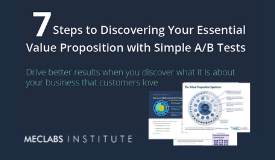Ask MarketingSherpa: Balancing search engine optimization, conversion optimization and conversation
We frequently receive questions from our email subscribers asking marketing advice. Instead of hiding those answers in a one-to-one email communication, we occasionally publish edited excerpts of some of these conversations here on the MarketingSherpa blog so they can help other readers as well. If you have any questions, let us know.
Dear MarketingSherpa: My question is about balancing the SEO needs with the conversation needs, an issue when driving traffic through organic rankings.
I think the issue I am struggling with is “the thing that a customer might search for is not what they want to buy.”
I know how to rank any page for anything, and through your training, I am beginning to know how to think about a page that achieves its objectives.
I think what I am struggling with is balancing the two and deciding what keywords to optimize the home page for when trying to combine the two objectives, i.e., SEO optimization versus buyer optimization, and then you have to go through the stage of the buyer’s journey as the language they use will be different at each stage.
Regards,
Adrian Tatum
Director
Effective Business Growth
Dear Reader: Adrian, you have hit on a deep challenge that many marketers feel. Some marketers come at it from the opposite direction. They view SEO (search engine optimization) and conversion optimization as separate. And I think this is because of the “when you have a hammer, everything looks like a nail” effect. Too often we’re siloed within our own disciplines.
I’ve heard the theory that load time and various other SEO factors give you a better quality score and therefore must be the factors that improve conversion.
While decreasing page load time has been shown to increase conversion, a myopic focus on SEO factors can hurt conversation with your visitors on your webpages. For this reason, the factors that improve SEO are not necessarily the same factors that improve conversion. They aren’t diametrically opposed either, but they are not one and the same. In one instance, you’re optimizing for an algorithm. In the other, you’re optimizing for a human thought process.
The hammer-nail challenge faces many companies and agencies, and it’s probably a blind spot for all of us in some way. For example, a company can be so focused on SEM (search engine marketing) and traffic-driving that they overlook where they are sending that traffic. The same holds true for SEO. You don’t just want traffic, you want traffic that will take an action.
The companies we work with have come to the realization that SEO landing pages need conversion optimization, their bigger concern is they don’t want to make changes that improve conversion but then lose their traffic so they’ll ultimately be down overall. Google is the big scary wizard behind the curtain, and when a marketer has won it over, the last thing they want to do is lose that.
Essentially, you need to make conversion changes without losing SEO, add value without risking search rank.
Really, this isn’t just an SEO problem. This is the challenge of marketing as a whole. What customers need isn’t necessarily what customers think they need, what customers will actually buy isn’t always the same as what they search for.
Let’s use marketers as an example customer. A marketer may search for “how to increase email list size” or “how to increase sales” but the solution isn’t necessarily tied to an email product or a sales product. The real solution for them may be to improve the value proposition.
Here’s another example. I’m on the board for my Homeowner’s Association. We recently had an unlocked car broken into in our neighborhood. So I started searching for security cameras. Most of the websites had security cameras with similar functionality. However, one of them had this headline: “Don’t capture faces. Capture license plates. 70% of crime involves a vehicle. Police say a license plate is the best evidence to solve a crime.”
I wasn’t searching for a license plate reader. The thought hadn’t even crossed my mind. I was searching for a security camera, but I didn’t really want that either. I wanted a deterrent to crime, and I wanted a way to catch the perpetrators. A few of my neighbors had security cameras, and they were interesting because you could see the perpetrators in action. But then what? You still didn’t know who they were and didn’t have any evidence to help the police catch them and stop them from re-offending. So the license plate reader copy on that homepage tapped into my true pain point.
Adrian, you are savvier than many in that you understand this challenge. As Harvard professor Theodore Levitt has said, “People don’t want to buy a quarter-inch drill bit. They want a quarter-inch hole.”









